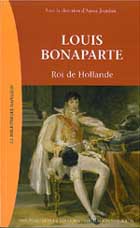From the publishers:
Louis Napoleon was, for the greater part of his youth, an obedient brother in awe of his more famous sibling. His unhappy relationship with the brilliant but superficial Hortense de Beauharnais simply reinforced Louis' rather uninspiring image given to him by posterity's extremely harsh critique of the Bonaparte family. Opposite the great Napoleon in all his genius and glory Louis the Melancholic certainly cuts a decidedly sad figure. The most passionate period of his life – his appointment to the Dutch throne by an emperor desperate to impose his system on Europe and defeat the British might – has almost been forgotten.
Named to the throne in spring 1806, Louis overcame his natural character to show himself a true Bonaparte. Much like his older brother, he was authoritarian – even autocratic -, a tireless worker, was of an inquisitive and enlightened disposition and sought to know, control and do everything. But Napoleon did not mean for Holland to be independent. Torn between his fraternal obligations and his duties as sovereign, Louis rallied the Dutch public to Napoleon's regime and became known as a “good king”, attentive to his subjects' needs.
About the editor: Annie Jourdan is an associate professor in European Studies at the Universiteit van Amsterdam. Specialist in the history of the Revolution and the First Empire, she has published a number of works, including notably Napoléon. Héros, imperator, mécène (Aubier, 1998), L'Empire de Napoléon (Flammarion, 2009), Mythes et légendes de Napoléon (Privat, 2004) and La Revolution : une exception française ? (Flammarion, 2004).
Summary
Introduction: “La Hollande en tant qu'objet de désir et le roi Louis, fondateur d'une monarchie nationale”, by Annie Jourdan
– Chapter 1: “Louis Napoléon et la mort de la république”, by Wyger Velema
– Chapter 2: “Du suffrage populaire au décret royal. Le déclin de la démocratie sous le roi Louis”, by Renger de Bruin
– Chapter 3: “Le “compte rendu au roi” de Gogel et les finances publiques du royaume de Hollande”, by Wantje Fritschy
– Chapter 4: “La codification et la formation d'un Etat national sous le roi Louis”, by Peter van den Berg
– Chapter 5: “Une justice néerlandaire sous emprise française. La réorganisation du pouvoir judiciaire dans le royaume de Hollande”, by Maarten van Boven
– Chapter 6: “Louis Bonaparte aux prises avec l'inertie hollandaise”, by Joke Roelevink
– Chapter 7: “Le système continental et sa signification pour le royaume de Hollande”, by Johan Joor
– Chapter 8: “Un militaire sur le trône ? Le roi Louis et les corps d'armée”, by Jos Gabriëls
– Chapter 9: “Les ordres de chevalerie de Louis Napoléon”, by George Sanders
– Chapter 10: “L'école primaire dans le royaume de Hollande”, by Martijn van den Burg
– Chapter 11: “'Un simulacre de roi'. Les représentations néerlandaises du roi Louis sous la Restauration”, by Matthijs Lok
– Chapter 12: “Le roi Louis, un modèle pour Guillaume ? Observations critiques sur une nouvelle idée reçue”, by Ido de Haan and Jeroen van Zanten
– Chapter 13: “Louis Napoléon et la société néerlandaise. Attentes et projets”, by Eveline Koolhaas-Grosfeld
– Chapter 14: “La santé et la salubrité dans le royaume de Hollande”, by Esther Starkenburg
– Chapter 15: “Le roi Louis et l'architecture : une politique nationale”, by Thomas von der Dunk
– Chapter 16: “Louis Bonaparte et les Beaux-Arts. Le cas des artistes vivants et du musée royal”, by Ellinoor Bergvelt
– Chapter 17: “L'intention patriotique de Louis Bonaparte et les arts décoratifs en Hollande”, by Aagje Gosliga
– Chapter 18: “Artisans, courtisans et marchands. Présences et passages néerlandais à Paris du temps du royaume de Hollande”, by Willem Frijhoff
Conclusion: “La destinée tragique du 'bon roi' Louis”, by Annie Jourdan
Louis Bonaparte, Roi de Hollande (in French)
Author(s) : JOURDAN Annie (ed.)

- Year of publication :
- 2010
- Place and publisher :
- Paris: Nouveau Monde
- Number of pages :
- 510

